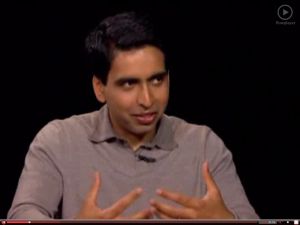|
I’m very excited to see that the Internet may allow us to unlock the doors to education. Salman Khan’s Khan Academy took a giant step forward, and now some prestigious universities are following. It’s just in time, because the cost of higher education is out of control. Why?
Salman Khan, at a recent Wall Street Journal Executive Conference (The 19 minute video is worth watching) explained why top universities charge $60,000 per year:
So one party thinks they’re selling a very kind of an enriching experience, and the other one thinks that they’re buying a credential. And if you ask the universities what percentages of your costs are “credentialing,” they say oh, maybe 5% to 10%. And so I think there’s an opportunity if we could decouple those things—if the credentialing part could happen for significantly less.
John Hennessy, president of Stanford University, replied:
Now Stanford’s on-line experiment (initiated by Google’s Sebastian Thrun, not Sanford’s administration) is joined by some heavy hitters:
- In May, Harvard and MIT announced edX, slated to offer full-blown online courses this Fall, apparently at no cost. In the announcement of edX, its president claims “This is the biggest change in education since the invention of the printing press”. Credentials? “Certificates of mastery will be available for those who are motivated and able to demonstrate their knowledge of the course material.”
- Coursera, partnering with Stanford, the University of Michigan, Princeton, and University of Pennsylvania, will offer courses at no cost, but will charge money for still undefined additional services. (Do these include accredited degrees? I have no idea.).
- Udacity has grown out of Stanford and is beginning to offer free online courses. It’s headed by Sebastian Thrun (who led Google’s driverless car project). In a Wall Street Journal interview, Mr. Thrun says “The dialogue always focuses on what’s going to happen to the institutions. I’m totally siding with the students.”
Do you remember the effect that email had on hierarchies? It flattened them. Maybe e-education will have the same effect. Victor Hugo (1802-1885) said it best: “All the forces in the world are not so powerful as an idea whose time has come.”




